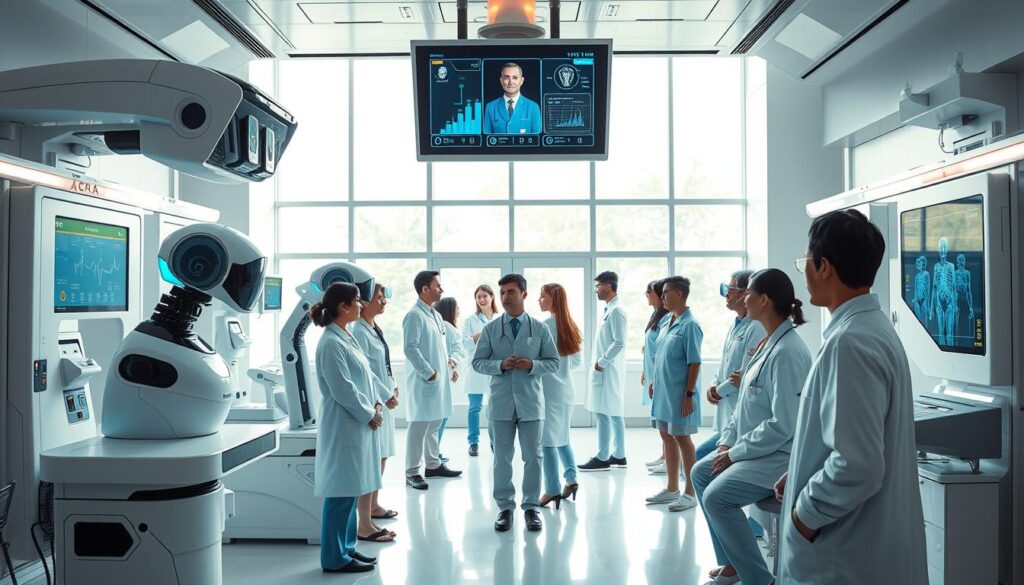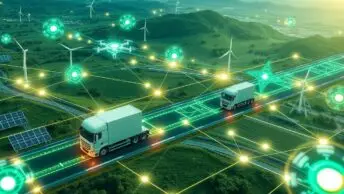AI Initiatives are at the forefront, offering solutions to Global Challenges. They aim to create Social Impact in healthcare, economic empowerment, and beyond. The key question is whether we can use AI to achieve not just profit but also deep social equity.
Picture an AI world shaped by Brigit Helms’ work in 45 countries. Her insights lead to impactful actions in every community1. Imagine combining Brian Patrick Green’s ethics with the World Economic Forum and tech giants. Together, they forge an Ethical AI vision for our future1.
These leaders prove AI can be a force for good. But to truly make a difference, we must tackle Global Challenges. Equity in healthcare, education, and sustainability are vital. AI is not a cure-all. But with ethical use and teamwork, it can spark inclusive progress. The future of AI depends on using it responsibly, for the good of all.
We aim to use AI not just for business or predictions, but to make life better for everyone2. This future relies on visionaries and ethical guidelines. Here, AI is seen not as a threat but as a source of hope.
This is more than a dream. It’s a call to action. Incorporating AI into society asks if we’re ready to use it for good. Balancing innovation with ethics is crucial. A humane, balanced use of technology is within our grasp.
The journey ahead offers a chance to tackle inequality and revive communities. Embracing AI ethically can shape a future where technology uplifts society. How we use AI could define our era.
Revolutionizing Poverty Alleviation Through AI
The digital age, driven by AI, is changing how we fight poverty. It brings new chances for jobs and access to financial services. AI tools allow solutions to be personalized and data-focused, helping those in need the most.
AI-Powered Economic Opportunity Enhancement
AI digs through lots of data to spot who really needs help from poverty relief programs3. It makes gathering information faster, more fair, and trustworthy, making sure aid has a bigger effect3. AI also predicts the results of economic plans, so policymakers can test ideas before putting them into action3. For example, the UK’s FCDO sees AI as key in its global development work, planning an AI-focused initiative4.
Personalised Education Initiatives for Underprivileged Societies
For a deep dive into AI’s changes, especially by ChatGPT in its first year, visit an interesting article about ChatGPT’s evolution and its big impact on the tech scene.
AI is key in making economies and education better. It not only offers custom help but also leads to major changes in fighting poverty and fostering worldwide progress.
AI for Environmental Conservation: A Sustainable Approach
Artificial Intelligence (AI) is changing the story of our environment for the better. It helps with smart farming and better use of clean energy. Thanks to advanced analytics, AI predicts soil and weather conditions to improve crops6. Notably, Google’s DeepMind tech is making energy use smarter in its centres. This cuts down on energy needs and greenhouse gases6.
In farming, Farmwise’s AI robots target and remove weeds accurately. This reduces the need for harsh chemicals, thus protecting our crops and meeting global sustainability goals6.
As AI grows, it’s becoming a key player in saving our environment. It promises a healthier planet and a brighter future for us all.
Empowering Disaster Response with AI Technology
Today, AI is transforming how we handle disasters, making emergency responses faster and more efficient. It enhances teams’ abilities by giving them instant data and forecasts that save lives8. This tech is vital in our current fast-paced world.
So, AI’s role in disaster response is growing, showing big improvements in emergency handling. It’s a vital asset in our fight against the harmful impacts of natural and human-made disasters8.
Increasing Healthcare Access via AI Innovations
Artificial intelligence (AI) is changing the way we deliver healthcare worldwide. It uses smart algorithms and data analysis to better detect diseases. This leads to more personalised treatment, improving how we access healthcare.

Recent AI advances have made many hopeful. They believe AI can reduce stress on healthcare systems, including the NHS11. The NHS faces challenges from more demand and not enough staff11. Creating a solid AI strategy quickly is vital. This will ensure AI’s benefits are felt widely, not just in small areas of success11.
Transformative AI in Disease Detection and Diagnostics
AI has a big role in finding diseases early. It looks at huge amounts of medical data fast and well. This helps catch diseases sooner and track them as they change. AI can spot health problems in medical images better than the old ways. This leads to quicker, more focused care. Finding diseases early is key to better health outcomes and wider healthcare access.
AI and the Advent of Personalised Medical Treatments
Personalised medicine is a big deal in AI healthcare innovations. It customises care based on our genes and health past. This approach makes treatment plans better and cuts down bad reactions to drugs. AI also helps make precise medicines. These are better tailored to work well and cause fewer side effects.
For AI to work well in healthcare, we need a safe, well-controlled place for its use in the public sector11. We must set up strict rules and test AI systems thoroughly to make sure they work safely11. Also, we need to plan for a big staffing gap in the NHS, predicted to hit nearly 250,000 positions by 203012. Good planning and using our resources wisely is crucial for getting the most from AI in healthcare12.
AI for Social Good: Bridging the Education Equality Gap
AI Tutoring Systems are changing the game in Education Equality, especially in areas with fewer resources. They customize teaching content and speed to each student’s needs, offering Personalized Learning. This method boosts their academic success and interest in learning13. Tailored learning is vital where there are few educational tools or traditional teaching methods don’t meet every student’s unique way of learning.
Plus, AI sorts through lots of data to find education hurdles that different communities face. With this knowledge, more tailored and broadly applicable educational strategies and AI Tutoring Systems can be put in place. By doing so, education becomes more fair worldwide, helping close the Education Equality gap significantly13.
The benefits of AI in education are just the start; its potential stretches to other areas of social good too. For instance, it helps distribute resources wisely in poor areas and supports government efforts to aid those in need14. At the same time, AI is being used to tackle major global issues like climate change. It helps monitor environmental harm and make energy use more efficient13.
When thinking about social good, connecting AI with sustainability is key. Efforts like the AI Commons aim to share tech solutions far and wide, supported by many organizations. They work towards creating AI that’s not just smart and innovative but also ethical and trusted14. This approach means AI can help with various Sustainable Development Goals (SDGs), boosting its role in tackling big challenges while avoiding harm14.
To learn how AI is making waves in other areas, check out its impact on marketing strategies. This shows how deeply this technology is influencing our lives today.
AI in Sustainable Development: Building Resilient Communities
AI stands at the cutting edge of making our world more sustainable. It plays a key role in helping societies face and tackle various challenges. By bringing artificial intelligence into the mix, cities and communities can boost their toughness. They also move closer to achieving important goals for sustainability.
From Precision Agriculture to Smart Cities: The Role of AI
AI has changed the way we farm through precision agriculture. It makes sure we use resources well and cuts down on harmful environmental effects. This helps a lot in creating a sustainable future. AI also leads the charge in making cities smarter. It boosts how well cities work and makes life better by managing traffic and how much energy we use. This shows perfectly how resilient communities can be made. Thanks to AI, achieving 134 targets in the Sustainable Development Goals15 could be within reach.
AI-Driven Disaster Preparedness and Climate Change Mitigation
AI is great at predicting risks, which is key for being ready for disasters. It gives us the info we need to act early. This is also crucial for fighting climate change as timely data helps in picking the right strategies to lessen our environmental footprint. AI helps design cities that can withstand climate issues and natural disasters16. AI impacts many areas, potentially aiding in 79% of targets for all SDGs15. It’s vital in advancing the goals of sustainable development.
Humanitarian Aid in the Age of AI: Ethical Challenges and Advances
Using AI in humanitarian aid marks a big step forward. It opens new paths for solving major global problems. Yet, this progress brings up big ethical issues that need careful handling and a strong focus on ethics of technology17. AI can make humanitarian work more efficient by providing insights that go beyond what humans can achieve. This could change how aid is given and reach more people in need18.
Social entrepreneurship leaders worry about how AI is used, especially concerning openness and responsibility18. The problem with AI making decisions that humans can’t easily understand is a major challenge. It’s hard to trust AI’s choices in vital areas like health care and handling pandemics if the process isn’t clear18.
Many groups, including international bodies and governments, have set principles for using AI responsibly17. But, these ethical guidelines for AI aren’t always followed as strictly as laws. This situation shows the need for strong, universally agreed-upon rules. Such rules would help ensure AI works for the benefit of everyone and follows ethical standards17.
There’s a big hope that AI can help achieve the United Nations Sustainable Development Goals. This shows the massive potential AI has to help the world18. But, using powerful AI tools in humanitarian work must be done carefully to avoid unexpected negative impacts18. Experts like Brian Patrick Green stress the need for strict standards. These are essential for protecting those who receive aid and the groups that provide it.
As technology and humanitarian work become more intertwined, discussions on AI ethics will grow stronger. It’s vital that everyone involved in technology and aid works together. They must make sure the advances in AI help us without compromising ethics or human dignity.
Global Issues and Ethical AI: Ensuring Inclusivity and Fairness
As artificial intelligence (AI) grows worldwide, Ethical AI and fairness become more vital. They’re crucial for sharing AI’s benefits fairly and avoiding harm that could deepen societal gaps. These aspects make sure AI helps everyone without worsening existing inequalities.
Addressing Bias and Promoting Transparency in AI Applications
Research across 48 academic articles from 2017 to 2022 shows a gap. It’s seen that focus is more on diversity inside AI teams than on making AI tools boost diversity outside19. While gender gets lots of attention, vital factors like ethnicity and language are often ignored, though they’re crucial for true inclusivity19. As AI blends into our society, its transparency becomes key. There’ve been cases where AI wrongly gave poorer healthcare to less represented groups or unfairly judged female candidates for tech roles, showing the dire need for open and fair AI rules20.
Regulatory Frameworks and Global Governance of AI Use
The discussion on AI regulation is changing, stressing the need to use AI safely and justly. The World Economic Forum suggests equity and inclusion must be considered throughout AI development19. Agreeing with the National Institute of Standards and Technology (NIST), recognizing bias sources — from data collection to algorithm crafting — is crucial. This will help craft rules that ensure AI is fair and doesn’t discriminate19.
In wrapping up, as AI’s role in society grows, from healthcare to policing, creating and enforcing rules on Ethical AI is key. It will shape AI’s impact on creating a fairer world. By focusing on these elements, all involved can help AI become a force for good and social progress. Hence, committing to Ethical AI that’s transparent and inclusive is more than necessary; it’s imperative.
In Summary
The possibility of AI to make the world better is huge. It can change how we solve big problems, like helping the planet. A study looks at 15 companies using AI for good. They work on things like better education, health, fighting hunger, and protecting our environment21. These leaders show how AI can include more people in the digital world. They work to close the gap between people who have internet in the city (67%) and in the countryside (31%)22.
But, there are big challenges too. A major one is not having enough people who know how to work with AI21. Also, AI sometimes makes decisions in ways we don’t understand. And sometimes it’s not fair. We need to fix these issues to really use AI for good21. Companies like Infosys and CropIn are using AI to help the planet. Others, like Paytm and PhonePe, offer more personal services. This shows how AI is growing in India across many areas22.
To make a better future with AI, we need more companies to join in. That includes learning platforms and government projects22. The stories of these ventures show why we need more research and help. AI isn’t just an option; it’s necessary. We need it to tackle big issues with new solutions and to bring everyone together for change2122.
FAQ
How is AI contributing to social impact and addressing global challenges?
AI is helping solve big problems by finding new solutions. It uses smart analysis, learning from data, and quick information processing. This way, AI helps reduce poverty, improve health, save our environment, and respond to disasters. And all this is done while making sure it’s good for people’s futures.
What role does AI play in revolutionizing poverty alleviation?
AI helps small businesses grow by giving them tools to work better and predict market changes. It makes getting credit easier with new kinds of data, and offers custom education to help poor communities. This helps end the cycle of poverty.
How is AI used in environmental conservation efforts?
AI is making farming green, using energy wisely, and looking after nature. It checks lots of data to suggest better farming, save resources, and make policies. This helps us live in harmony with Earth and meet global green goals.
Can AI technology improve disaster response strategies?
Yes, AI can change how we handle disasters. It looks at many kinds of data to predict and act early. AI helps make quick, smart plans for emergencies, making us ready and lessening harm from disasters.
In what ways are AI innovations increasing healthcare access?
AI makes spotting diseases quicker and more accurate by looking at medical pictures with smart tools. It also helps create treatments just for you by understanding your genes and health history. This could make healthcare work better and cost less.
How does AI help bridge the education equality gap?
AI breaks down barriers in education with custom learning and AI tutors. They give unique support and fit different student needs. This adds to regular teaching and makes good education reach more kids, even in poor places.
What are the contributions of AI to sustainable development?
AI boosts sustainability by making farming accurate, cities smart, and preparing for disasters better. It’s key in fighting climate change, using smart predictions for quick and right actions. This helps us build a greener future.
What ethical challenges and advances are associated with humanitarian aid in the age of AI?
Using AI in helping people raises questions about fairness and avoiding harm. Moving forward, it’s vital to use AI kindly and justly, promoting respect and equality. People working on tech ethics are vital in tackling these issues.
How are global issues and ethical AI related in terms of inclusivity and fairness?
There’s a danger AI might make unfairness worse if not handled right. It’s key to make AI work for everyone, making sure it’s fair and includes all. Rules and checking on AI can help keep its impact good for all people around the world.
What is the role of regulatory frameworks in the ethical use of AI?
Rules for AI set the bar for using it right, keeping data safe, and protecting from harm. They help make sure AI helps everyone fairly and safely. Such rules are crucial for keeping people’s trust in AI and making the most of it for good.
Source Links
- Harnessing AI For Social Impact – https://impactentrepreneur.com/product/harnessing-ai-for-social-impact/
- Harnessing AI for Social Good: Addressing Global Challenges – https://www.linkedin.com/pulse/harnessing-ai-social-good-addressing-global-rohan-mathew-yxxte
- REVOLUTIONIZING POVERTY ALLEVIATION POLICIES WITH AI-ENHANCED RANDOM EVALUATION – https://www.linkedin.com/pulse/revolutionizing-poverty-alleviation-policies-random-victor
- AI in International Development: does the UK’s White Paper underestimate its significance? | Oxford Policy Management – https://www.opml.co.uk/insights/ai-international-development-does-uks-white-paper-underestimate-its-significance
- Artificial Intelligence for Social Good : Addressing Global Challenges – https://www.linkedin.com/pulse/artificial-intelligence-social-good-addressing-global-singh-cpfxc
- 8 Ways Artificial Intelligence Can Contribute to Environmental Conservation – https://2030.builders/8-ways-ai-can-contribute-to-environmental-conservation/
- AI & Sustainability: Artificial Intelligence for Tackling Environmental Challenges | FDM Group – https://www.fdmgroup.com/news-insights/ai-and-sustainability/
- PDF – https://turcomat.org/index.php/turkbilmat/article/download/14407/10424/26131
- AI for Social Good: Solving Humanitarian and Environmental Challenges – https://www.linkedin.com/pulse/ai-social-good-solving-humanitarian-environmental-dave-balroop-7bqwc
- Applying artificial intelligence for social good – https://www.mckinsey.com/featured-insights/artificial-intelligence/applying-artificial-intelligence-for-social-good
- Priorities for an AI in health care strategy – https://www.health.org.uk/publications/long-reads/priorities-for-an-ai-in-health-care-strategy
- Artificial intelligence in healthcare: transforming the practice of medicine – https://www.ncbi.nlm.nih.gov/pmc/articles/PMC8285156/
- AI for Social Good: How Technology is Tackling Global Challenges and Promoting Equality. – https://www.linkedin.com/pulse/ai-social-good-how-technology-tackling-global-m5paf
- AI for social good: unlocking the opportunity for positive impact – Nature Communications – https://www.nature.com/articles/s41467-020-15871-z
- The role of artificial intelligence in achieving the Sustainable Development Goals – Nature Communications – https://www.nature.com/articles/s41467-019-14108-y
- AI as a catalyst for sustainable development – https://www.orfonline.org/expert-speak/ai-as-a-catalyst-for-sustainable-development
- AI for humanitarian action: Human rights and ethics – http://international-review.icrc.org/articles/ai-humanitarian-action-human-rights-ethics-913
- AI for humanitarian action: Human rights and ethics – https://international-review.icrc.org/sites/default/files/reviews-pdf/2021-03/ai-humanitarian-action-human-rights-ethics-913.pdf
- AI for all: Diversity and Inclusion in AI – AI and Ethics – https://link.springer.com/article/10.1007/s43681-024-00485-8
- Building Inclusive AI: Addressing Bias and Promoting Fairness – https://www.linkedin.com/pulse/building-inclusive-ai-addressing-bias-promoting-fairness-santosh-g-m4s4c
- The promises and perils of applying AI for social good in entrepreneurship – https://blogs.lse.ac.uk/businessreview/2022/02/23/the-promises-and-perils-of-applying-ai-for-social-good-in-entrepreneurship/
- AI For Social Good: Revolutionising Lives Through Operational Excellence – Forbes India – https://www.forbesindia.com/article/isbinsight/ai-for-social-good-revolutionising-lives-through-operational-excellence/91413/1






